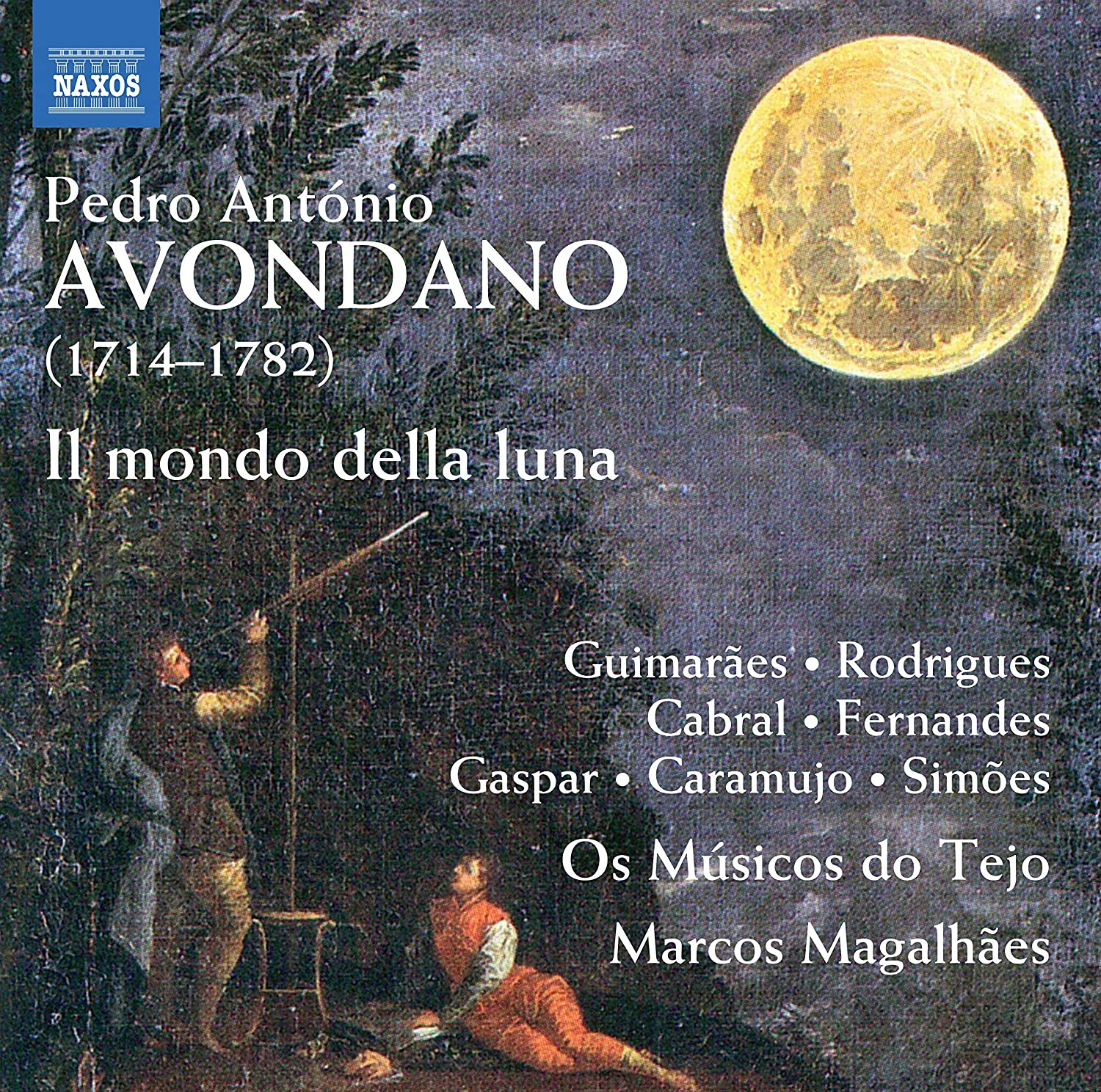Fernando Guimarães tenor, Luis Rodrigues bass, Susana Gaspar soprano, et al
Os Músicos do Tejo directed by Marcos Magalhães
137:17 (2 CDs)
Naxos 8.660487-88
Click HERE to buy this recording on amazon.co.uk
[These sponsored link keep the site alive and FREE!]
During the first half of the 18th century, opera in Portugal pursued a somewhat fitful course, a mixture of local genres such as zarzuela and the Italian opera that swept Europe during the latter half of the previous century. Only after 1750, with the accession of the opera-mad King José I, was there a truly flourishing operatic scene in Portugal, though that was severely disrupted by the Lisbon earthquake of 1755, which destroyed the recently built Casa da Ópera just months after its inauguration.
Pedro António Avondano’s Il mondo della luna was given its first performance at another royal theatre, Salvaterra de Magos in 1765. Avondano was the son of an Italian violinist who had found employment in the lavishly appointed royal chapel of Jose I’s immediate predecessor, João V. He followed in his father’s footsteps, serving in the chapel between 1754 and 1782, writing both secular and sacred music. Il mondo della luna, based on a libretto by Carlo Goldoni first set by Galuppi in 1750 and subsequently by a number of composers including Haydn (1777), is his only opera. A three-act comic opera, it follows the usual format for a Goldoni opera of including a number of duets and, crucially, the act finales with continuous musical and often hectic dramatic development that the Venetian writer played such a large role in establishing as an essential component of opera buffa. All are employed in Il mondo, the plot of which concerns the efforts of the suitors of Clarice and Flaminia, the daughters of Buona Fede, a rich, but naïve old man, to fool him into believing he has been transported to the moon, where he has been duped into believing that women live according to the strict moral code he would impose on his daughters. Delighted with the lunar world, Buona Fede then has to watch the farrago that has been planned for him unfold, ultimately leaving him little option but to accede to the marriage of both girls and his shrewish maid, Lisetta, who he had hoped to marry himself.
Avondano’s music reveals him to be not only thoroughly conversant with buffa style, but melodically gifted and capable of orchestral writing that makes extensive use of the wind band. Arias are mostly brief and while few are memorable, there are several in the sentimental style that leave an impression, Clarice’s act 2 ‘Quanta gente che sospiri’ being perhaps the stand-out example, while his handling of the act finales is assured.
The present recording stems from performances given in the Teatro Thalia in Lisbon and omits some scenes and arias. It is curious, indeed unique in my experience, that while recitatives were recorded in live performance, the musical numbers were not, though there is little difference in acoustic. More fascinating is the experimental manner in which the recitatives were prepared, the cast learning the text but fitting it to music only after hearing the accompaniment in rehearsal. It certainly works in part, for the recits have an immediacy and lively point that is not always the case. Against that there are places where it feels over-played, in particular the silly voices adopted for what is presumably intended as ‘moon-speak’, which soon becomes irritating on record, particularly when no text or translation is available with the set.
The performance is dominated by the splendidly rounded bass of Luis Rodrigues’s Buona Fede, who also turns in a master class in vocal acting, relishing the foolish old man’s gullible antics. There is also some fine singing from the principal young couple, Ecclitico (Fernando Guimarães) and Clarice (Susana Gaspar) and another excellent bass, João Fernandes as the servant Cecco. The period-instrument orchestral playing is decent, if not of outstanding quality and the whole idiomatically directed with considerable verve by Marcos Magalhães. If a certain provincial air hangs over the project, that is more than outweighed by its infectious exuberance, a case of the heart being very much in the right place.
Brian Robins
